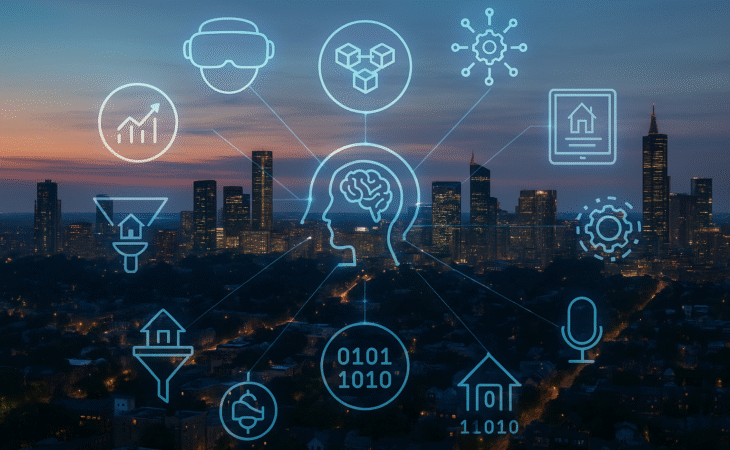
The real estate industry is in the middle of a digital transformation. From AI to blockchain, from predictive analytics to virtual tours, the profession of tomorrow looks very different from today. These 11 trends are not abstract theories—they are already reshaping how realtors generate leads, build trust, and close deals. Let’s dive deeper into each one.
1. AI-driven client engagement & consulting
Artificial intelligence is no longer just a buzzword. With tools like ChatGPT, realtors can personalize communication at scale. AI predicts client needs, drafts property descriptions, answers FAQs 24/7, and provides instant translations for international buyers. For consulting, AI can evaluate comps and neighborhood data, delivering tailored advice in seconds. Realtors who adopt AI gain more time to focus on personal relationships.
2. Automated valuation & price forecasting
Valuations are the backbone of trust. Algorithms powered by machine learning now deliver more accurate price estimates by combining property details, market comps, historical data, and live trends. Automated price forecasting also allows sellers to position their properties more competitively and buyers to invest with confidence. This trend reduces human error and speeds up negotiations.
3. Virtual tours & digital twins
Buyers no longer need to travel for every viewing. Virtual tours let clients explore properties remotely—on their phone, laptop, or VR headset. Digital twins go even further: creating 3D replicas of homes that can be “walked through” or even redesigned virtually. This saves time, increases transparency, and allows realtors to market properties to international audiences.
4. Blockchain for transactions & ownership
Traditional property transfers involve piles of paperwork and weeks of waiting. Blockchain introduces smart contracts that execute automatically when conditions are met. This ensures secure, transparent, and fast transactions. Ownership records stored on blockchain reduce fraud, speed up due diligence, and simplify cross-border deals—making real estate truly global.
5. Realtor ecosystems & platform integration
Instead of juggling dozens of disconnected tools, the future belongs to integrated platforms. CRMs, marketing tools, listing portals, and communication apps are merging into unified ecosystems. Realtors will work inside digital hubs where lead generation, communication, and analytics are connected. This not only saves time but also creates smoother experiences for clients.
6. Custom GPTs for text, CRM & follow-ups
Generic chatbots are being replaced by specialized GPTs—AI agents trained for real estate. They write blog posts, generate listings, manage CRM workflows, and even follow up with leads automatically. Imagine a bot that remembers client preferences, drafts a WhatsApp reply, and schedules a follow-up meeting in your calendar—all in seconds.
7. Big Data & predictive analytics for location choices
Location has always been king, but predicting tomorrow’s hotspots requires more than intuition. Big Data aggregates demographics, infrastructure projects, school ratings, and even social media trends. Predictive analytics highlight up-and-coming neighborhoods before prices skyrocket, giving realtors and investors a competitive edge.
8. Digital owner acquisition with funnel systems
Cold calling is giving way to automated funnels. Landing pages, targeted ads, and email workflows capture property owners online and convert them into leads. Realtors track every step—who clicked, who opened, who requested a valuation. Funnel systems create measurable pipelines, allowing agencies to optimize acquisition like e-commerce businesses.
9. Real estate as digital assets & tokenization
Properties are becoming digital investment products. With tokenization, a property can be divided into digital shares (tokens) and sold to investors worldwide. This opens real estate to smaller investors, increases liquidity, and creates new revenue models. For realtors, tokenization could mean selling not only whole properties but also fractions—expanding the client base.
10. Consolidation by platforms & franchise giants
As in retail and hospitality, market power in real estate is shifting toward global platforms and franchises. Giants with massive tech budgets dominate marketing, data, and client experience. Independent realtors will need to specialize, partner, or join ecosystems to stay competitive. Consolidation is both a challenge and an opportunity for niche players.
11. Voice-enabled websites
Voice search is changing how clients access information. Future real estate websites will be navigable by voice: “Show me 3-bedroom apartments in Alanya under €200,000.” This accessibility is especially important for mobile users and international clients. Realtors who implement voice interfaces will stand out with convenience and inclusivity.
Conclusion: The future of real estate is being built right now. Realtors who adopt AI, blockchain, virtual tools, and predictive analytics early will gain a decisive competitive edge. Success will belong to those who combine technology with human values—trust, empathy, and vision.
These interactive seminars take place every Wednesday at 10:00 AM (DE Time), where you can continue to learn about ChatGPT and other AI tools. Each week, we’ll focus on a new topic.
Zoom Link to Join:
🔗 Zoom Link: Click here to join
These seminars are packed with valuable insights for realtors and entrepreneurs. Join us every week for a fresh topic.
Every Wednesday, we will cover a new topic. Stay tuned and continue to learn about how AI, digital marketing, and the real estate industry are evolving.
🌞 Sunny greetings from Alanya,
Jürgen Lindemann
🌐 Visit us at: www.GLOIM.com
If you would like to learn more about the Realtors 2033 seminar and the use of ChatGPT in the real estate sector, please fill out the form below to request the relevant document. We will send you the necessary information as soon as possible.